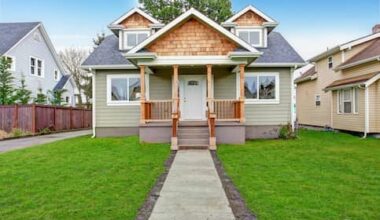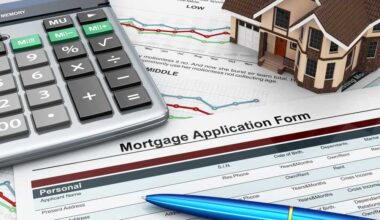Have you thought about buying a second home? A secondary property can be an excellent long-term investment. It can also help you make extra money and provide a respite from regular life. But, you’ll need to know if you can afford to buy a second home.
If you want to buy a second home, here are some things to consider, as well as some pointers on how to get started.
Why Do You Need To Buy a Second Home?
Living in a popular resort or other places may be a dream come true, but it’s crucial not to become too sidetracked by the natural beauty. Ask yourself difficult questions such as, “Why do I want a house here?” and “What would I do with it if I had it?”
Location is the first, second, and third most important consideration in any real estate transaction. Make an effort to learn about area resale prices, economic trends, tax rates, schools, health care, and amenities. Finally, the best location for your second home will be determined by your reasons for wanting to own one. Here are some examples of possible uses for a second home:
- Spend more time at a favorite vacation location.
- Provide an investment that can generate income and eventually increase in value.
- Provide you with a place to live when you retire.
- Rent to others for a brief period of time while yet allowing you to come frequently. A financial expert can assist you in determining how this rental revenue will benefit you.
- Give you a permanent address so you can rent or sell your current primary residence.
- Repair and resell
If you believe you might want to live in the property permanently, or even keep it as a vacation home, you might consider renting a home in the same neighborhood for a short period of time first. This will allow you to test out life at the location before making a large purchase.
If money is scarce, don’t be afraid to be inventive. You might be able to share ownership of a second home with another borrower while still realizing your dream of having a second home.
How to Buy a Second Home
#1. Locate a real estate agent.
Finding a real estate agent in your target region is the best method to go about buying a second home. The right realtor can provide you with price histories, comparable sales data, and resale possibilities.
A skilled agent is aware of market trends. how long homes have been on the market; if there are homes not currently on the market that may be available; why one side of the street may be worth 5% more than the other; if the backyard direction gets more sun; and how close schools, restaurants, city centers, airports, country clubs, and marinas are.
Putting all of this together allows the buyer to make the best decision possible, not only about the home but also about the location in their new community.
When interviewing possible agents, inquire about how long the agent has lived and worked in the region, as well as how involved he or she is in the neighborhood.
#2. Obtain a mortgage preapproval.
Getting preapproved for a mortgage when buying your first home demonstrated that you were a serious buyer. Buying a second home is no exception. A pre-approval demonstrates that you’ve already done some legwork to move the deal forward and that a lender is ready to assist you in making the acquisition.
Rates should also be compared. If you can reduce your interest rate by a few percentage points, you can save thousands of dollars in the long run, which means you can relax in your second home knowing you’re paying less.
#3. Search for a second home
As you did with your first home, be open to visiting a variety of different properties for your second home to evaluate what best suits you and your family’s needs. Investigate local property tax rates and try to gain a sense of the local home market. Is it rising, implying that the value of your second home may rise as well?
#4. Make a proposal
It’s time to buy when you’ve found the perfect place to call your home away from home. If you can make a hefty down payment while still leaving plenty of cash reserves, go for it – a larger commitment upfront can pay off in the long run and lessen your overall debt burden.
Keep in mind that obtaining insurance for a second home may be more difficult than for a primary residence. If you’re thinking about buying a second home near the beach, for example, you’ll require flood insurance. Flood insurance has become more difficult to obtain in coastal regions, and the cost has risen tenfold in some markets. Discuss these costs with your agent and ensure that your budget is in sync.
Where Can I Buy a Second Home?
Choosing where to buy your new home is a big decision. Should you buy a home near your family? Or would you prefer one on a beach, in the mountains, or in your favorite city?
It is critical to consult with your spouse and any other family members who may be involved in this choice. Spend some time investigating the greatest local neighborhoods. Collaborate with a local real estate agent to identify the ideal locations for a second home. Furthermore, this simplifies the initial step of the home-buying process, preapproval. Conducting preliminary research on your new location, collaborating with a real estate agent in that area, and analyzing your finances inside the new place can demonstrate proactive initiative to your lender as you navigate the mortgage procedure for your second house.
Uses of Second Home
Some purchasers have a clear vision for their second home before making a purchase, but it’s okay if you don’t. Consider your alternatives; it may even force you to relocate. It’s vital to know that the property may qualify as a second home with Rocket Mortgage® if it’s rented out for no more than 180 days in a calendar year. You must also live in the home for 14 days or 10% of the time the property is rented, whichever is larger.
#1. Vacation home:
If you have a large family, travel frequently, or simply want your own place to call home while you’re gone, a vacation home may be just what you’re looking for. You should select a location that you enjoy visiting and exploring. Many people prefer jumbo or conventional loans for a vacation home mortgage. It’s crucial to understand that getting a mortgage is identical to getting a loan for your primary home, albeit with slightly higher restrictions.
#2. Secondary residence:
Does your employment necessitate frequent travel to or time spent in another city? You might think about using your property as a second home.
#3. Investment Property
Some homeowners will buy a second home as an investment property. Typically, this entails either flipping and reselling the home or renting it out. Second houses have different requirements and financing rates than investment properties. Many homeowners, for example, cannot use a jumbo loan to fund an investment property since many lenders consider it an “investment” if rented out more than 14 days per year. In contrast, with a traditional loan, you can rent your second home for up to 6 months.
FHA and VA loans, which are backed by the federal government, are also out of the question. Make important to have a thorough discussion with your mortgage professional to ensure that your mortgage meets your aims.
You can use your second home for any of the above purposes. You could vacation there for a set length of time and then rent it out for the rest of the year through Airbnb and short-term leases.
Can I Afford To Buy a Second Home?
Are your finances in such good shape that you can afford to buy a second home? Even if you intend to earn rental money from the second home you want to buy, you should be sure it’s a purchase you can afford, especially if it will be vacant for several months each year.
Here are some financial considerations to keep in mind.
#1. Interest Rates And Down Payment
Unless you want to pay cash, buying a second home will necessitate a down payment and a mortgage (with interest, of course).
In fact, a larger down payment is necessary for a second home. Why is this the case? Purchases of a second home pose a larger risk to a mortgage lender due to the higher likelihood of default on a second home (vs a primary dwelling) in the event of financial difficulties.
The same reasoning may be used for interest rates. A mortgage for a second home nearly always has a higher interest rate to hedge against potential losses in the case of a default.
#2. Debt-to-Income Ratio Requirements
To qualify for a mortgage for a second home, you must meet debt-to-income ratio (DTI) guidelines. The amount of debt you have versus the amount of money you make is referred to as your DTI. To calculate your DTI, add together your monthly debt payments and divide them by your monthly pre-tax wage.
To get qualified for a second mortgage, most lenders want a DTI of 43 percent or less.
#3. Budgeting for the Month
You may be accepted for a second mortgage on paper, but you should do the numbers to see if taking out another loan makes financial sense. To do this, sum up all of your monthly payments and remove the total from your monthly post-tax wage. The remaining funds will be used to make your second mortgage payment.
You may be banking on rental revenue to help balance out your second mortgage payment, but you should still be sure you can afford the payment on your own in case your home doesn’t rent as quickly as you’d like.
Before making this selection, you should also consider property taxes, homeowners association fees, and general upkeep expenditures.
#4. Rental Properties Maintenance
You should also budget for the expense of buying a rental property as well as the associated maintenance. You will be responsible for all repairs and damages as both the owner and maybe the landlord. This could include hiring a repair person, purchasing paint, doorknobs, and other home improvement supplies, or hiring a lawn service to maintain the yard.
Set aside at least 10% of the yearly fee for maintenance and property management. If your property rents for $2,000 each month, the annual rent would be $24,000. As a result, you should set aside $2,400 for emergency repairs. Keep in mind that repairs could cost more or less than this estimate, so having more money saved is always a smart idea.
Conclusion
Buying a second home is a wonderful strategy to diversify your real estate portfolio and create additional income. Decide how you will use your home and which location makes the most sense before purchasing it. After you’ve budgeted and decided to invest in a second home, consider the first stage of home buying: being preapproved for a mortgage. This is a critical stage in determining how much of your second home you can finance.
How To Buy a Second Home FAQs
How much should you put down on a second home?
On a second home, though, you will almost certainly need to put down at least 10%.
Is it harder to buy a second home?
Lenders view second houses as riskier, whether they are holiday homes or investment property. Minimum credit score criteria are often greater, and maximum debt-to-income ratios are lower than for a principal dwelling.
How do I know if I can afford a second home?
When deciding how much second home you can afford, your debt-to-income ratio is a crucial financial metric to consider. Simply expressed, your debt-to-income ratio is the percentage of your gross monthly income that goes toward debt obligations (total monthly debt payments divided by gross monthly income).
- How Many Working Hours in a Year: How to Calculate, Stressfree!!!
- MORTGAGE RATES FOR INVESTMENT PROPERTY: Current Mortgage Rates for Investment Property
- REQUIREMENTS TO BUY A HOUSE: A Step-By-Step Guide
- Secondary Mortgage Market: Step By Step Guide On How It Works
- MORTGAGE LOAN ORIGINATOR: What They Do & How To Become One






